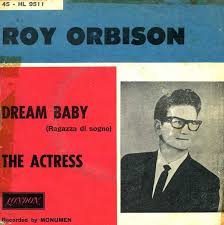| "Dream Baby (How Long Must I Dream)" | ||||
|---|---|---|---|---|
 | ||||
| Single by Roy Orbison | ||||
| from the album Roy Orbison's Greatest Hits | ||||
| B-side | "The Actress" | |||
| Released | February 10, 1962 [1] | |||
| Recorded | January 9, 1962 [1] | |||
| Studio | RCA Victor Studio B, Nashville, Tennessee [1] | |||
| Genre | Rockabilly | |||
| Length | 2:34 | |||
| Label | Monument | |||
| Songwriter | Cindy Walker | |||
| Producer | Fred Foster | |||
| Roy Orbison singles chronology | ||||
| ||||
"Dream Baby (How Long Must I Dream)" is a song written by Cindy Walker which was first recorded and released by Roy Orbison originally as a non-album single in 1962. It was a big international hit for Orbison, reaching number 2 in both the Australian and the UK singles charts and number 4 in the U.S. Billboard . It was also a top ten hit in Canada and Norway. Five months later, "Dream Baby" was included on Orbison's Greatest Hits compilation LP.
